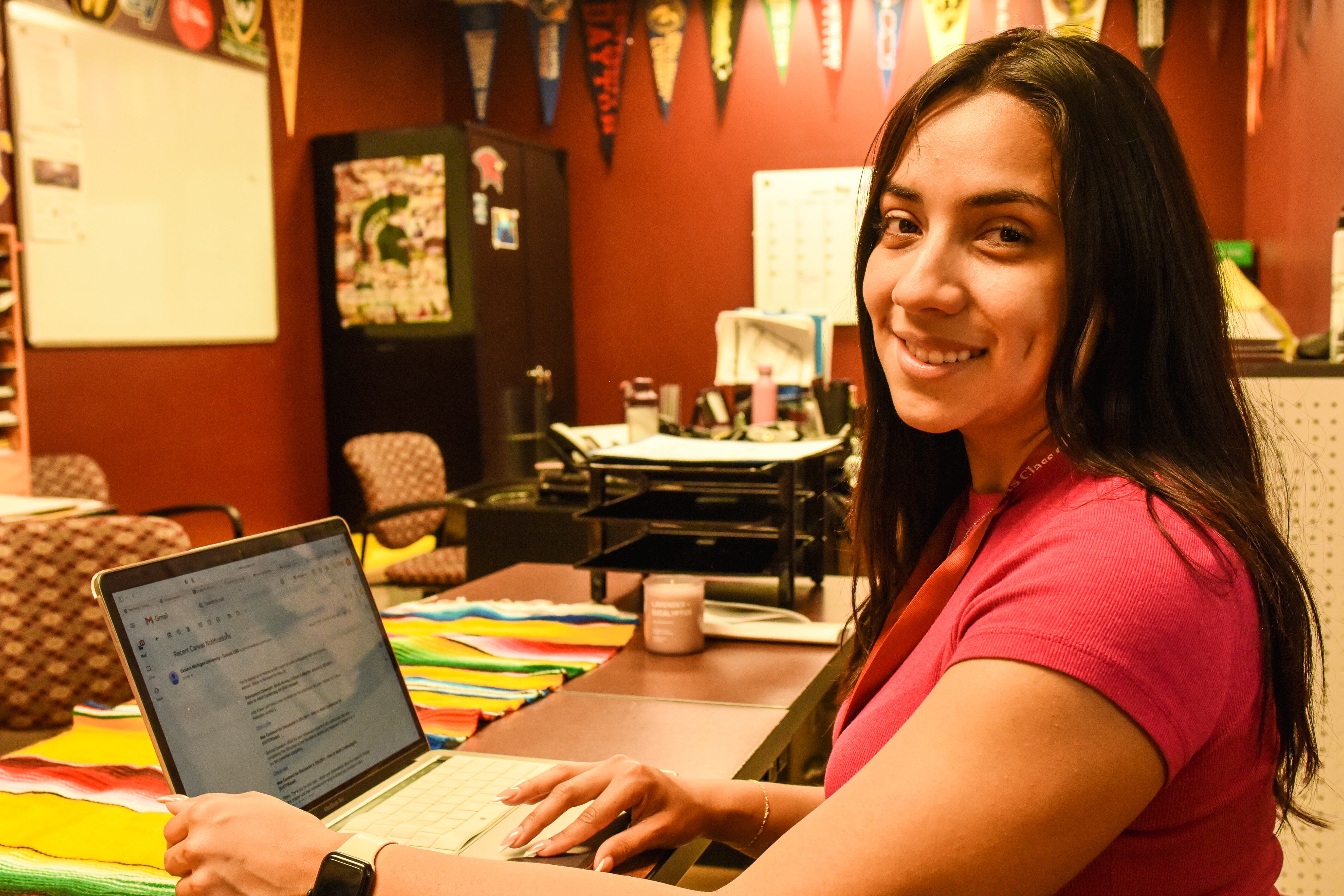When Alicia Alvarez first stepped through the doors of her office at Western International High School five years ago, it was “a full circle moment.”
The college transition advisor already knew the school intimately.
This spring marked 10 years since Alvarez graduated from the same school where she works today. At Western, she is building a college-going culture. That means supporting young people each step of the way — from showing them which colleges are out there to helping them navigate the application and decision processes. Her work is vital in a city where fewer than 20% of residents hold college degrees, yet she is among only a handful of college advisors left in Detroit public schools after budget cuts last year.
Alvarez is clear-eyed about this massive undertaking.
Removing the barriers that stand in the way of underserved students who want a college education is a constant challenge. This year, the rocky rollout of the new federal financial aid application, or FAFSA, presented huge obstacles for many of the young people she works with.
Alvarez said some students, like those coming from mixed immigration status households, had to wait months to submit the form. (One of the initial glitches prevented students whose parents do not have a social security number from completing the application.) Amid the complications and delays, some gave up on the process altogether.
“Some students got discouraged and were just like, ‘You know what, like, maybe this isn’t for me,’” Alvarez said.
Nearly three-quarters of students at Western are Latino or Hispanic, and many of the young people Alvarez works with are newcomers to the United States. Often, she said, they come from Central America, where they have witnessed violence and death along their paths to the U.S. She has become a confidante to many of these young people.
The school of more than 1,900 students is the home of a newcomer program initiative that Detroit Public Schools Community District plans to expand in the fall. School leaders launched the program a few years ago in response to a growing number of newly arrived students enrolling at Western.
This year alone, Alvarez estimated that about 20% of the students she worked with were new to the U.S. It is a student population that Alvarez knows well. She began working with newcomers during her first teaching job at a charter school in Detroit.
“They’re the most ambitious, dedicated students that I ever worked with,” she said.
Chalkbeat spoke with Alvarez about working with vulnerable young people, what it’s like to walk the same hallways she once navigated as a student, and how her experience as a first-generation college student impacts her college guidance work.
This interview has been lightly edited for length and clarity.
Could you talk about your time as a student at Western and how it informs the way you help students today?
The fact that I was a student here not too long ago just makes me relate to the kids a little bit more because I know the struggles they go through. Most of them relate to or look like me. When I tell them, yeah, I graduated exactly 10 years ago, it just makes them more comfortable. I was in their same exact shoes, and it’s just really nice to be back.
Some of the staff that was here when I was a student still work here. [Angel Garcia], the principal here, was my teacher when I was in 10th grade, so that just makes the relationship a lot stronger.
And I just know the obstacles and challenges that [our] students have to go through. So when it comes to different opportunities [and] scholarships, I know which ones they qualify for. Instead of them just going online and researching scholarships that are open to the whole country, I can narrow it down. That’s my approach. I make them believe in themselves. Most of them are first-generation. And I was a first-generation student, so I can relate with them. I just want to be that support that they need.
Could you talk more about how you approach helping vulnerable students?
This year alone, I’ve had a lot of newcomers, and most of them have been here for less than a year. And they are very vulnerable. It’s frustrating that the system is obviously not made for them, but I’ve been able to help them.
There’s been a lot of challenges when it comes to FAFSA, and a lot of them don’t qualify for [federal] financial aid, or scholarships. Despite all the challenges, they still want to go to college, so we just have been working hard. Most of them are really realistic and understand, OK, I don’t have a Social Security Number — am I still able to go to college? What’s going to happen after college? Am I going to be able to get a job? All that is uncertain, right? Because things can change, laws can change, we never know.
But I feel like we can’t take the American Dream or having a college degree or college education away from them. I think getting an education is never a waste of time. It can open so many doors.
Most of them are very hesitant, like, “Do you think I’ll be successful in college? I don’t know the language.” But like I told them, if you try it out and it’s something that doesn’t work out for you, at least you can say, I tried. A lot of schools do have ESL support for students, so there are opportunities and resources available.
What do you want people to know about the challenges this year with FAFSA and how they affected your students?
It was extremely challenging this year, to say the least. Seniors’ last day [of school] was May 17 — and most of them had still not had their FAFSAs processed. And based on that, they weren’t able to make any decisions. A lot of students got discouraged because of all the challenges [and] not being able to submit their application.
But all I want to say is, even if you are undocumented, or your parents are undocumented, that shouldn’t stop you. Yes, it might be challenging, but you should still be able to get the financial support that you need to make college a possibility for you.
(Find some resources for filling out the FAFSA here.)
Can you think of an experience working with students that’s really stuck with you or changed the way you approach your work as a college transition advisor?
A lot of students have told me this year that if it wasn’t for me taking them on a college field trip, they would have never applied to that school or gone to college. And that just makes my job worth it, right? Even those students who might not consider college at the end of the year should be exposed to college, right? And I had so many students that just needed that support. So they weren’t thinking about college or applying for scholarships or anything, and then towards the end of the year, they committed to a school.
You are a first-generation college graduate. How did you know that going to college was something you wanted to do?
My dad has a sixth grade education. But despite that, he’s always been very strict about school. My mom has some college. She didn’t graduate, but she went to Michigan State University for [about] a year and a half. School was always something that they pushed. Now my parents have four college graduates — we all have college degrees. My older sister has a master’s, and I’m currently in grad school myself.
Robyn Vincent is a reporter for Chalkbeat Detroit, covering Detroit schools and Michigan education policy. You can reach her at rvincent@chalkbeat.org.








